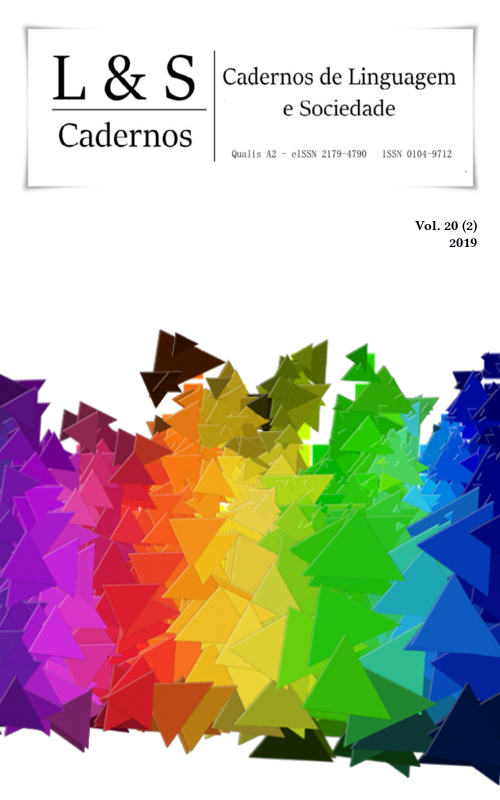Discourse and financial literacy: the construction of women’s social identity in personal finance books
DOI:
https://doi.org/10.26512/les.v20i2.26997Keywords:
Social identite, Gender, Financial literacy, DiscourseAbstract
We analyze, through the theoretical-methodological approach of Critical Discourse Analysis (CDA), the construction of women's social identity in personal finance books adressed to the female audience, through the analysis of injunctive sequences. In addition to ADC, we rescued studies on financial literacy and gender, in order to verify how discursive practices dialogue with narratives about the feminine and consumption. The study concludes that the books contribute little to the development of women's financial education, approaching the self-help discourse. The texts reconfigure discourses that reproduce stereotypical views of female and disregard economic and social issues that involve Brazilian women's financial problems.
Downloads
References
ASSEF, A.; LUQUET, M. Aposentada fica a sua avó: um guia de independência financeira das meninas iradas. São Paulo: Saraiva, 2008.
ASSEF, A.; LUQUET, M. Meninas normais vão ao shopping, meninas iradas vão à Bolsa. 2. ed. São Paulo: Saraiva, 2007.
ASSEF, A.; LUQUET, M. Meninas normais casam... meninas iradas investem na relação. São Paulo: Saraiva, 2009.
ASSUMPÇÃO, M. As representações da mulher profissional brasileira e norte americana construídas pela mídia impressa. Dissertação (Mestrado em Linguística Aplicada e Estudos da Linguagem) ”“ Pontifícia Universidade Católica de São Paulo, São Paulo, 2008.
AUGUSTINIS, V. F.; COSTA, A. de S. M.; BARROS, D. F. Uma análise crítica do discurso de educação financeira: por uma educação para além do capital. Revista ADM.MADE, Rio de Janeiro, ano 12, v. 16, n. 3, p. 79-102, set./dez., 2012.
BUCHER-KOENEN, T. et al. How financially literate are women? An overview and new insights. The Journal of Consumer Affair, v. 51, n. 2, p. 255-283, 2017.
CHOULIARAKI, L.; FAIRCLOUGH, N. Discourse in late modernity. Edinburgh: Edinburgh University Press, 1999.
COLLING, A. M. Tempos diferentes, discursos iguais. Dourados: Editora da UFGD, 2014.
CONFEDERAÇÃO NACIONAL DO COMÉRCIO DE BENS, SERVIÇOS E TURISMO (CNC). Pesquisa de endividamento e inadimplência do consumidor ”“ PEIC. 2019. Disponível em: https://www.fecomerciopr.com.br/wp-content/uploads/2018/09/PEIC-maio-3.pdf. Acesso em: 20 jun. 2019.
CONNELL, R.; PEARSE, R. Gênero: uma perspectiva global. São Paulo: nVersos, 2015.
DRIVA, A.; LÜHRMANNB, M.; WINTER, J. Gender differences and stereotypes in financial literacy: Off to an early start. Economics Letters, n. 146, p. 143-146, 2016.
FAIRCLOUGH, N. Analysing discourse: textual analysis for social research. London/New York: Routledge, 2003.
FAIRCLOUGH, N. Discurso e Mudança Social. Brasília: Editora da Universidade Federal de Brasília, 2001.
GEE, J. P. An introduction to Discourse Analysis: Theory and method. London/New York: Routledge, 2001.
KÖCHE, V.; MARINELLO, A.; BOFF, O. Os gêneros textuais e a tipologia injuntiva. Caderno Seminal Digital, ano 15, v. 11, n. 11, 2009.
LUSARDI, A.; MICHAUD, P.-C.; MITCHELL, O. S. Optimal financial knowledge and wealth inequality. Journal of Political Economy, v. 125, n. 2, p. 431-477, 2017.
LUSARDI, A.; MITCHELL, O. S. The economic importance of financial literacy: theory and evidence. Journal of Economic Literature, American Economic Association, v. 52, n. 1, p. 5-44, 2014.
MAGALHÃES, I. Introdução: a Análise de Discurso Crítica. D.E.L.T.A., v. 21, n. esp., p. 1-9, 2005.
MCLOUGHLIN, L. A critical discourse analysis of South Asian women’s magazine. London: Macmillan Publisher, 2017.
OCHS, E. Constructing Social Identity: A Language Socialization Perspective. Research on Language and Social Interaction, v. 26, n. 3, p. 287-306, 1993.
ROSA, A. A sequência injuntiva passo a passo. 2003. 144 f. Dissertação (Mestrado em Linguística) ”“ Universidade Federal de Pernambuco, Recife, 2003.
SANTOS, L. C. B. do. O que fazer com seu dinheiro: o discurso de autoajuda em manchetes de capas de jornais. 2013. 198 f. Dissertação (Mestrado em Letras) ”“ Centro de Artes e Comunicação, Universidade Federal do Pernambuco, Recife, 2013.
SAVOIA, J. R. F.; SAITO, A. T.; SANTANA, F. A. Paradigmas da educação financeira no Brasil. Revista de Administração Pública - RAP, Rio de Janeiro, v. 41, n. 6, p. 1121-1141, 2007.
SIQUEIRA, R. R. Mulher, uma construção social: representações, estereótipos e imagens. Rev. Ambivalências, v. 2, n. 3, p. 6-41, 2014.
VAN LEEUWEN, T. The representation of social actors. In: CALDAS-COULTHARD, Carmen R.; COUTHARD, Malcolm. (ed.). Texts and Practices: readings in Critical Discourse Analysis. London: Routledge, 1996.
WODAK, R.; MEYER, M. Methods of critical discourse studies. 3. ed. Los Angeles/London/New Delhi/Singapure/Washington DC: SAGE Publications, 2016.
WODAK, R.; WEISS, G. Analyzing European Union discourses: Theories and applications. In: WODAK, R.; CHILTON, P. (eds.). A New Agenda in (Critical) Discourse Analysis: Theory, methodology and interdisciplinarity. Amsterdam/Philadelphia: John Benjamins, 2005. p. 121-135.



